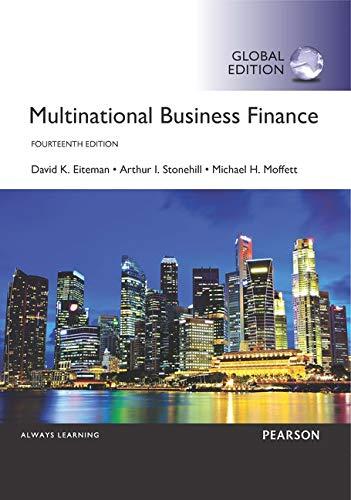McDonalds Corporation (NYSE: MCD) is one of the worlds most well known and valuable brands. But as
Question:
McDonald’s Corporation (NYSE: MCD) is one of the world’s most well known and valuable brands. But as McDonald’s has grown and expanded globally, so have the investment risks associated with is investment in more than 100 countries. Like most multinational firms, it considers its equity investment in foreign affiliates capital at risk—risk of loss, nationalization, and currency valuation.
McDonald’s has been quite innovative in its hedging of these combined currency risks over time, finding new ways to construct old solutions—Hoover Hedges—but doing so with cross-currency swaps.
Hoover Hedges A multinational firm that establishes a foreign subsidiary puts capital at risk, a long-time fundamental of international business. Financially, when the parent company creates and invests in a foreign subsidiary it creates an asset, its foreign investment in a foreign subsidiary, which corresponds to the equity investment on the balance sheet of the foreign subsidiary. But the equity investment in the foreign subsidiary is now in local currency, the currency of the foreign business environment. If this is the predominant currency of this subsidiary’s business, it is termed the functional currency of the subsidiary. Going forward, as the exchange rate between the two country currencies changes, the parent company’s equity investment is subject to foreign exchange risk.
Many multinationals have attempted to hedge this equity investment exposure with what can be described as a balance sheet hedge. Since the parent company possesses a long-term asset in the foreign currency, the company tries to hedge this by creating a matching long-term liability in the same currency. A long-term loan in the currency of the foreign subsidiary has typically been used. The loan itself is often structured as a bullet repayment loan, in which interest payments are made over time but the entire principal is due in a single final payment at maturity. In this way, the principal on the long-term loan acts as a match to the longterm equity investment These hedges are typically referred to as Hoover Hedges following the court case of Hoover Company (a vacuum cleaner manufacturer) versus the U.S. Internal Revenue Service2. The primary issue in the case was whether the gains and losses from short sales in foreign currency that the Hoover Company used as hedges were to be considered ordinary losses, business expenses, or capital losses and gains, for tax purposes. Although borrowing in the local currency is frequently used, there are a number of other potential hedges of equity investments including short sales and the use of traditional foreign currency derivatives like forward contracts and currency options.
McDonald’s Business Forms McDonald’s has structured its business in a variety of different ways depending on marketplace. In the United States the company has utilized a franchising structure where it awards a franchise to a private investor. That investor then has exclusive rights over the sale and distribution of McDonald’s products and services within the designated franchise zone. McDonald’s corporation will own the land and building, but the franchisee is responsible for the investment in all equipment and furnishings required for the restaurant under the franchise agreement—from the paint-in—as they describe it. This structure allows McDonald’s to expand with a lower level of capital investment (the franchisee is investing a significant portion), and at the same time create a financial........
Mini-Case Questions 1. How does the cross-currency swap effectively hedge the three primary exposures McDonald’s has relative to its British subsidiary?
2. How does the cross-currency swap hedge the long-term equity position in the foreign subsidiary?
3. To what degree, if at all, Should Anka—and McDonald’s—worry about OCI?
Step by Step Answer:

Multinational Business Finance
ISBN: 9781292097879
14th Global Edition
Authors: David Eiteman, Arthur Stonehill, Michael Moffett





